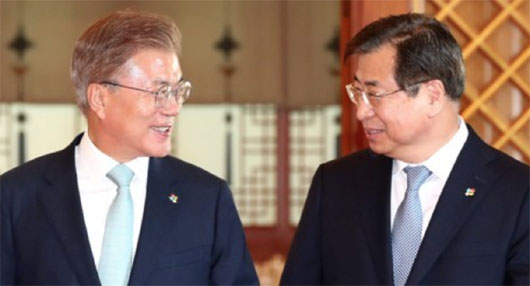by WorldTribune Staff, June 19, 2017
The administration of liberal South Korean President Moon Jae-In has moved to reform the country’s intelligence agencies, which the president during his campaign accused of illegal meddling in domestic politics.
The National Intelligence Service (NIS) committee set up two task forces which will be assigned to overhauling the South’s spy organizations and investigating their involvement in domestic politics, Yonahp reported on June 19.

The reform of the NIS was one of Moon’s election pledges.
On June 1, new NIS Director Suh Hoon banned domestic intelligence operations from gathering information on government ministries, media and other organizations.
“The launch of the committee will be a historic starting point for the NIS to be reborn,” Suh said in a statement.
Suh played a key role in arranging summit talks with North Korean dictator Kim Jong-Il in 2000 and 2007, WorldTribune.com reported last month.
Suh joined Seoul’s spy agency in 1980 and served as a deputy director of the NIS in 2006-2008.
Conservatives want NIS’s focus to be on North Korea. Pyongyang is assumed to have an extensive network of infiltrators and agents of influence throughout South Korea, analysts say, particularly in the wake of the 1980 Kwangju incident.
More recent high-profile cases included the NIS’s alleged online smear campaign staged to sway public opinion in favor of the ruling conservative party ahead of the presidential election in 2012, the Yonhap report said.
Some NIS agents were suspected of being mobilized to post online comments to affect the vote, when then-conservative candidate Park Geun-Hye clinched a victory over Moon.
In 2013, the NIS unveiled a transcript of a 2007 inter-Korean summit, during which late former liberal President Roh Moo-Hyun called for changing the disputed de facto western sea border with North Korea into a “peace economic zone.”
There was criticism that the spy agency divulged state secrets to divert public anger away from a scandal involving then-spy chief Won Sei-Hoon, who allegedly ordered the online smear campaign against Moon for the 2012 election.
There has been minimal news coverage or controversy in South Korea about reports that the late leftist President Kim Dae-Jung’s administration used billions of dollars in Chaebol funding to purchase a summit in Pyongyang between Kim Dae-Jung and Kim Jong-Il.
The reporting by WorldTribune.com columnist Don Kirk led to a book co-authored with former NIS official Kim Ki-Sam, “How South Korea’s Kim Dae-Jung bought his Peace Prize and financed Kim Jong-Il’s nuclear program.”
Publication of the book was banned in South Korea and blocked in the United States at the last moment by legal threats against the publisher, according to Kirk who said the final galleys had been prepared for the press.
The new NIS committee consists of eight civilian experts and five former and current NIS officials. It will be headed by Jung Hae-Gu, a politics professor at Sungkonghoe University.
Letters to the Editor __ Subscribe to Geostrategy-Direct __ Support Free Press Foundation
